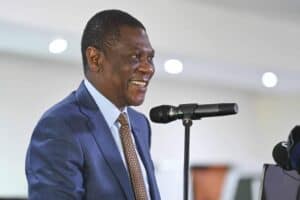The community was unhappy with the Commission for the Restitution of Land Rights (CRLR) determination to compensate them at a value of R610 per hectare because they believed this was way below market value.

The land restitution programme has not been a bed of roses for many affected claimants.
For some it’s a long wait and never-ending struggle for proper compensation they claimed and to finalise the land
transactions.
The Madonsi, Mpumalanga, community of 126 families is among those still waiting for full settlement and proper compensation despite their successful claim for a part of the Kruger National Park as their ancestral land.
Instead, tension between community and South African National Parks (SANParks) left the matter hanging – 23 years after the settlement.
The issue has been complicated by the fact that some of the claimants have died since the community was offered financial compensate. They disputed the offer, not just because it was calculated on half of the land they claimed, but also because the evaluation was way below market value.
Since 1998, Madonsi and four other communities – Mhlanganisweni, Mahashi, Ngirivane Mathebula and Muyexe – had been fighting a frustrating battle to be compensated at the right price for their ancestral lands under the control of SANParks, an entity of the department of environment, forestry and fisheries.
The Madonsi community has 126 land claimant families from Ponda, Mashangu Phalala, Zuzwini, Mandwali, Maguweni, Ribyi ra Gudlani, Vumanyundu, Malahla Phanga and Shangoni areas in the Kruger National Park.
It made a claim for 115 000 hectares of the Kruger National Park, but was only offered financial compensation for 79 702ha.
The community was unhappy with the Commission for the Restitution of Land Rights (CRLR) determination to compensate them at a value of R610 per hectare because they believed this was way below market value.
They are demanding a market-related valuation from SANParks. According to a community spokesperson and trustee of the Madonsi KNP Trust, Richard Miyambu, the process has been marred by a breakdown in communication between SANParks, government officials and the community.
“SANParks has been the biggest stumbling block to resolving the claim, as the officials have been resistant to implementing equitable redress,” he said.
Miyambu accused SANParks of favouritism among the communities with claims against the Kruger National Park.
He accused it of favouring certain community claimants because of alleged personal relationships with SANParks officials.
This has caused tensions. “Because of the ageing population, the biggest challenge has been that some people have died while the process was ongoing and have not been able to reap the benefits of the economic opportunities of the land of their forefathers,” Miyambu said.
The intervention in 2016 of the Vumelana Advisory Fund, a nonprofit organisation to support the beneficiaries of land claims, brought hope for the communities. Vumelana had been working with some of the communities, including Madonsi.
Vumelana’s programmes manager, Mazwi Mkhulisi, lamented the failure to resolve the matter. He believes the claims against the Kruger National Park – one of SA’s iconic natural heritage sites – should be demonstrating how environmental and land rights could coexist.
“Admittedly, this has to be one of the most challenging balances to strike, but it does not have to get to an extent where communities feel robbed of their rights to dignity and economic benefits,” Mkhulisi said.
“Perhaps it would be understandable if the delays between 2016 and now boil down to disagreements on working terms between claimant communities and SANParks. Sadly, the delay is primarily because the authorities cannot set out a negotiation process for SANParks and claimant communities.”
While there is a need to retain the land as a valuable conservation and tourism asset, the state had an obligation to bring justice to the communities.
This calls for balanced planning, management and equitable processes to be followed to maintain the two rights –for national conservation goals and communities’ rights in land.
Independent transaction advisor Geoff de Beer noted a significant number of verified land claims in the Kruger National Park and how the settlement agreements were yet to be finalised because of years of waiting for the CRLR to deal with the matters.
According to De Beer, a beneficiation scheme was supposed to have been designed and jointly approved within 18 months from 21 May, 2016, but to date there has been no agreement as negotiations between the parties had ground to a complete halt.
In November 2019, the Minister of Environment, Forestry and Fisheries Barbara Creecy and the commission agreed to an independent mediator to help break the logjam in the negotiations, but that mediator was only appointed to start in January 2021.
The matter was further delayed when the mediator withdrew and again left the process in limbo.
De Beer said the settlement of the Kruger National Park land claims had the potential to generate a number of positive outcomes. It could have mobilised considerable new private sector investment in infrastructure and facilities in the park based on partnerships between the land claimants and SANParks.
“It could also create much-needed additional employment opportunities,” he said.
“Furthermore, there are opportunities for identification and utilisation of small and micro enterprise development, mainly related to the rehabilitation of existing and construction of new infrastructure and facilities.” SANParks could not be reached for comment.






